Life would have been really pleasant if aliens hadn’t invaded the Stations. My plans were completely destroyed. It was terribly inconvenient.
Polymer, Sally Rogers-Davidson
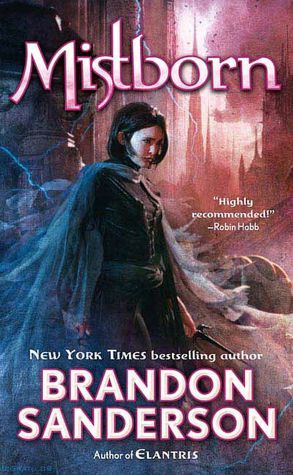 Mistborn, as it’s known in the US, or The Final Empire, as it’s known in UK/ANZ, is the first in Brandon Sanderson’s Mistborn trilogy. I include both covers because my ebook matched the top cover, but I’m fairly confident when I buy the sequels they’ll match the bottom edition (and be less smelly). No points for guessing which cover is which.
Mistborn, as it’s known in the US, or The Final Empire, as it’s known in UK/ANZ, is the first in Brandon Sanderson’s Mistborn trilogy. I include both covers because my ebook matched the top cover, but I’m fairly confident when I buy the sequels they’ll match the bottom edition (and be less smelly). No points for guessing which cover is which.
The premise of Mistborn is that a thousand years ago the evil overlord took power and began an immortal reign of terror and oppression in the region now known as the Final Empire. The peasants are heavily oppressed by the nobility — descendants of the Lord Ruler’s supporters back when he originally took over. And, although they have more money and power, the nobility are constantly watched by the Lord Ruler’s powerful minions.
Some nobles or people with noble blood (of which there are few because the law is that if a nobleman sleeps with/rapes a peasant woman, she must be killed soon afterwards to prevent half-breed spawn) have magic abilities. The magic system is based around metals. Allomancers “burn” different types of ingested metals to give themselves temporary powers such as super strength, super senses, magic metal vision, the ability to push or pull metal objects towards themselves (and if the object is anchored, to move themselves by pushing or pulling on metal objects). Some people, mistings, only have the ability to burn one metal but a special few, mistborn, can burn all of them.
 Enter our main characters. A band of misting (half-) peasant thieves, led by a mistborn, is set to try to take down the Final Empire. The story mostly focuses on their plans and the execution of those plans.
Enter our main characters. A band of misting (half-) peasant thieves, led by a mistborn, is set to try to take down the Final Empire. The story mostly focuses on their plans and the execution of those plans.
The world-building is fairly thorough, I found. There’s a lot of background things which are mentioned but which seem like they’ll be investigated further in the sequels.
I enjoyed reading all the characters’ PoVs. None of the properly developed characters were annoying, which is unusual now that I come to think about it. All the antagonistic characters, including the Lord Ruler, were mostly off screen or treated like evil forces rather than people. I think this worked well because otherwise we would have been forced to empathise with, for example, someone who killed a lot of good characters. It also reinforces the fact that most people in the world see the Lord Ruler as a god and his inquisitors as an extension of that godliness. “Forces of good v forces of evil” things where the evil doesn’t have much depth to it and is just evil for the sake of it, annoy me. However, Sanderson avoids that trap (explaining how is spoilery) which was nice to see. Also, a lot of the rebellion’s planning involves trying to subvert the ingrained thinking that it’s impossible to rebel against god, which was interesting.
Brandon Sanderson is one of the current Big Names of fantasy and, from this book, I’d say it’s deserved. There was amusing banter, there were lots of cool fights and some clever tricks. The only thing I would have liked to see more of is the development of the love interests. There was only one romantic storyline and I liked both the characters involved but I would have liked to see more of it. Hopefully, there’ll be more in the next book. Oh, also more female characters would have been cool. Only one of the main group, Vin, was female (arguably, she was the mainest character) and the only other women with speaking parts (ie not random peasants being slaughtered) were court ladies who weren’t in that many scenes. The presence of Vin as a pretty-damn-kick-arse central character meant the gender balance didn’t annoy me while I was reading and I only really noticed it looking back.
I recommend this book to lovers of fantasy. I’ll definitely be picking up the sequels when I can.
4.5 / 5 stars
 Winter Be My Shield is Jo Spurrier’s debut novel and the first book of Children of the Black Sun trilogy. I was lucky enough to receive an advanced review copy of this book from Harper Voyager.
Winter Be My Shield is Jo Spurrier’s debut novel and the first book of Children of the Black Sun trilogy. I was lucky enough to receive an advanced review copy of this book from Harper Voyager.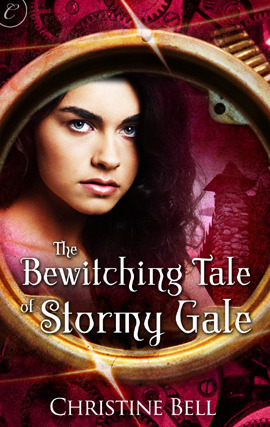 The Bewitching Tale of Stormy Gale by Christine Bell is the second story set in the same world and with the same protagonists. I read it without reading the first novella, The Twisted Tale of Stormy Gale, also from Carina Press, and I didn’t feel this novel/novella (it’s right on the cusp) suffered for it. I suspect it contained many spoilers for the first story, and I can guess the general plot of the first story, but at no point did I feel lost or confused for not having read it.
The Bewitching Tale of Stormy Gale by Christine Bell is the second story set in the same world and with the same protagonists. I read it without reading the first novella, The Twisted Tale of Stormy Gale, also from Carina Press, and I didn’t feel this novel/novella (it’s right on the cusp) suffered for it. I suspect it contained many spoilers for the first story, and I can guess the general plot of the first story, but at no point did I feel lost or confused for not having read it.
That said, it’s possible this review might contain spoilers for The Twisted Tale of Stormy Gale simply because I’m not entirely sure which bits might be spoilery. You’ve been warned.
Stormy, as she is affectionately known, is apparently a time pirate. I say apparently because nothing particularly piratical takes place in BToSG (sorry, it’s too long to keep typing out), but it’s part of her back story. She was born in 19th century London, spent her childhood poor and on the streets until she was taken in by a time-traveller who took her and her adopted brother to the 21st century at age 14ish. Now living in the 19th century and married to the Duke of Leister, I found Stormy a little too blasé about her acquired wealth. I was willing to believe that hanging out in the 21st century modern mannerisms might have rubbed off on her, but I was unwilling to believe that after a childhood of poverty she could so casually mention her toddler daughter intentionally destroying a dress without being angry for her ungratefulness. (Especially since Stormy isn’t a bad person.) It was a really minor, throw-away line but it bothered me for the lack of authenticity.
The story revolves around Stormy identifying a suspicious time traveller, having her husband and brother help her follow him around and then a rescue adventure after her brother accidentally gets himself transported in time with aforementioned shifty time traveller. They end up in Salem a couple of years after the witch trials where her brother appearing out of time gets him arrested for witchcraft. Of course.
It was a fun read. Not the kind of story to be taken too seriously because then you start noticing the people in the past sounding a little bit too much like modern Americans. There was a surprising twist near the end which livened it up after I thought the tying up of loose ends would be predictable. Stormy started out as brash and amusing but later on became a bit less of the strong heroine I was expecting. From what we learnt/were told about her, I expected more saving of the day on her part.
I’ve tagged it as romance, because it’s marketed thus, but the pairing isn’t the main character (since Stormy is already married). This didn’t bother me at all, but I thought maybe I should warn romance readers who might be expecting more.
Overall, I might pick up the first story and/or the sequel (when it becomes available at some unknown point in the future). I recommend it to anyone interested in a light time-travel story, with some light steampunk overtones and a bit of romance thrown in.
I received an advanced review copy of The Bewitching Tale of Stormy Gale courtesy of Carina Press. It will be released on the 28th May and will be purchasable from this link.
3.5 / 5 stars
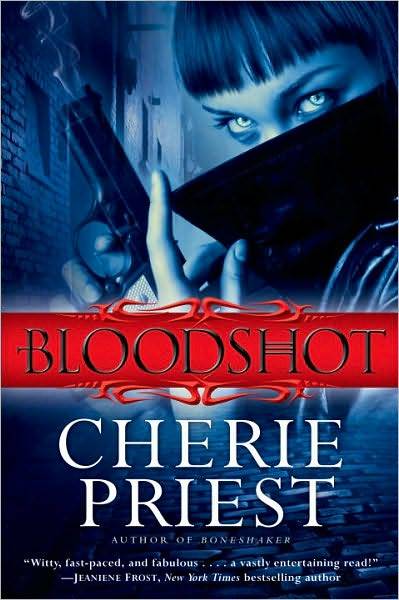 Bloodshot by Cherie Priest is not the first book of Priest’s that I’ve read. If it had been, I don’t know that I’d be convinced to pick up another of her books in the future. (I read Boneshaker when it was on the AussieCon Hugo ballot and enjoyed it.) It’s the kind of book that makes me glad I didn’t pay full price for it and assuages some of my “buying all the discount books when Borders was dying” guilt.
Bloodshot by Cherie Priest is not the first book of Priest’s that I’ve read. If it had been, I don’t know that I’d be convinced to pick up another of her books in the future. (I read Boneshaker when it was on the AussieCon Hugo ballot and enjoyed it.) It’s the kind of book that makes me glad I didn’t pay full price for it and assuages some of my “buying all the discount books when Borders was dying” guilt.
Raylene is a vampire for hire. Usually she’s hired to steal things — art, archaeological artifacts, home made porn… — and this time is no different. A mysterious vampire client (where her usual clients are human) hires her to steal some paperwork from a classified military operation. It’s a fairly simple story in which she sneaks around, trying to avoid the people suddenly out to kill her and completes the mission in a more roundabout way than they all initially suspected. Fine. It wasn’t a plot made of deep but it was the part I didn’t have a problem with. If it sounds like the kind of urban fantasy you might enjoy, then by all means, don’t let me ruin it for you by reading what I disliked in the rest of the review.
First, Raylene is fairly unlikeable. She’s somewhere between kickarse and paranoid and she talks too much. Some of the talking too much can be attributed to her personality/character development, but some of it was just poor writing. Many statements are rehashed or irrelevant details are harped upon in painstaking detail. There was so much justifying of her comments it felt as though the author was working too hard to point out the blindingly obvious to the reader. It very much could have done with more subtlety. Here is a random example from near the start:
I’m white as a compact fluorescent bulb, which you might expect from a woman who avoids the sun to the best of her ability, and my teeth… well, I try not to show them when I smile.
They’re not all incriminatingly pointy, don’t get me wrong. When I yawn I’m not flashing a row of shark’s choppers, but my canines are decidedly pokey. Thank God they don’t hang down as long as they once did. (I know a guy. He filed them or me.) These days they may be short, but they’re still sharp enough to puncture an oilcan, and that’s how I like it.
My hair is more or less the same as it always was, a shade of black that doesn’t require any further descriptors.
And so on. Bolding mine. It’s all overwritten in a similar vein. That particular sentence at the end made me angry when I read it because if it doesn’t require descriptors why put the descriptor in?
At times the characters talk in a stilted way, which would have bothered me more if I hadn’t given up and started skimming at that point. To be fair, not all the conversations were stilted, but enough to bother me. Too often the action scenes (which were numerous, it’s that kind of book and that isn’t a bad thing) were broken up by gratuitous description which made the situations less tense and caused me to skim down the page.
The final thing that bothered me relates back to Raylene being unlikeable. She’s a bit everything-ist, which is OK except once you stop and think just how much worse it would sound if she was male. Yeah. And then there was a drag queen character who I didn’t think was handled very well. There were some cringe-worthy aspects. (I’d be more specific, but they do actually involve spoilers.)
So yeah. I wouldn’t recommend this book. I won’t be reading the sequel. I might read Cherie Priest’s steampunk books — on the assumption that they’re more like Boneshaker than Bloodshot — and I have Four and Twenty Blackbirds (which is apparently southern gothic, though I’m not sure what that means) which I’ll still get to eventually. I’ve read worse books and I’ve read worse writing, but I couldn’t enjoy Bloodshot.
2.5 / 5 stars
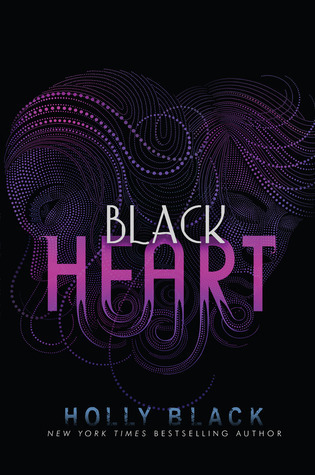 Black Heart by Holly Black is the third and final instalment of the Curse Workers trilogy. You can read my reviews of book one, White Cat, and book two, Red Glove, at those links.
Black Heart by Holly Black is the third and final instalment of the Curse Workers trilogy. You can read my reviews of book one, White Cat, and book two, Red Glove, at those links.
The series is a really good read. If you haven’t read it yet, I highly recommend it. Go read my review of White Cat if you’re not sure or want to know more. Otherwise, grab a hold of the books if you like fantasy YA.
Black Heart picks up not long after Red Glove left off. I enjoyed it a lot. It’s difficult to review this book without spoilers for the previous books. My review doesn’t contain spoilers for Black Heart, but if you haven’t read White Cat or Red Glove, you probably shouldn’t read the rest of the review. Best to start at my review of White Cat. So be warned, spoilers ahead!
~
…
SPOILERS FOR THE PREVIOUS BOOKS IN THE SERIES.
NOT SPOILERS FOR BLACK HEART.
BUT STILL, SPOILERS FOR WHITE CAT AND RED GLOVE.
YOU HAVE BEEN WARNED.
…
~
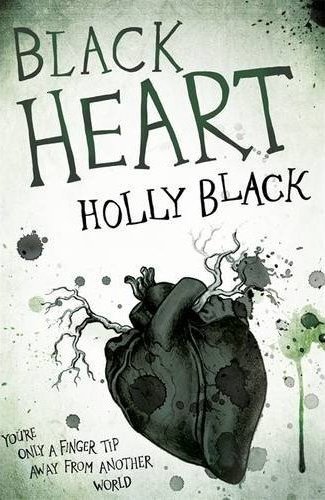 After Cassel’s deal with the Feds at the end of Red Glove, his life takes a different turn. He tries to balance staying on at boarding school with meetings with the Feds that he has to keep secret from his family and the crime boss who also wants his services. Sounds complicated, right?
After Cassel’s deal with the Feds at the end of Red Glove, his life takes a different turn. He tries to balance staying on at boarding school with meetings with the Feds that he has to keep secret from his family and the crime boss who also wants his services. Sounds complicated, right?
It was delightfully complex with several plot threads intertwined. Lots of people are constantly demanding things from Cassel — time, grades, help — and it’s written in such a way that the reader can sympathise with the stress he’s under without feeling confused.
One thing I found particularly interesting is that throughout the book I wasn’t entirely sure what choice Cassel would make for the direction of rest of his life. He has several options and many obstacles and disasters to dodge whichever path he chooses. While the ending isn’t a complete surprise, I didn’t find it telegraphed or obvious, which is nice.
Cassel’s friends, Sam and Daneca, play a more important role in Black Heart than in earlier books. From book one through to book three they shift from background to foreground characters. On the one hand, it means they’re being inadvertently drawn into Cassel’s world of cons. It’s an extra source of guilt for him, and also raises the stakes. (And they’re also really not the only thing he has to worry about.)
If you’ve enjoyed the earlier books in the series, this is more of the same but better. It’s more complicated, there’s more mystery (not so much just one main mystery like in Red Glove), and the cons are more elaborate and dangerous.
It’s an excellent book and a great conclusion to an excellent series. I highly recommend it.
4.5 / 5 stars
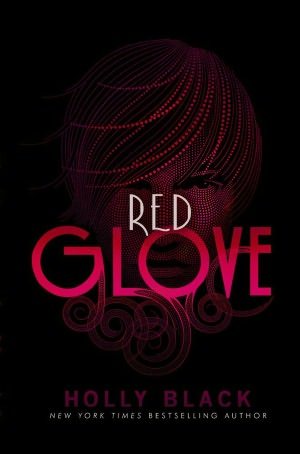 Red Glove by Holly Black is the sequel to White Cat, which I read and reviewed recently. This review doesn’t contain spoilers for Red Glove, but it does contain spoilers for White Cat. It’s the kind of book you can’t properly talk about without mentioning events at the end of the prequel. So if you haven’t read White Cat, don’t read on unless you like spoilers.
Red Glove by Holly Black is the sequel to White Cat, which I read and reviewed recently. This review doesn’t contain spoilers for Red Glove, but it does contain spoilers for White Cat. It’s the kind of book you can’t properly talk about without mentioning events at the end of the prequel. So if you haven’t read White Cat, don’t read on unless you like spoilers.
SPOILERS FOR WHITE CAT FOLLOW,
NOT SPOILERS FOR RED GLOVE.
BUT DON’T READ ON IF YOU HAVEN’T READ WHITE CAT AND DISLIKE BEING SPOILED.
YOU HAVE BEEN WARNED.
~
…
…
…
~
Right, that should be enough of a break. Also, I’m including the UK/Aus cover of Red Glove, because I like it more, even though I bought the cheaper US version.
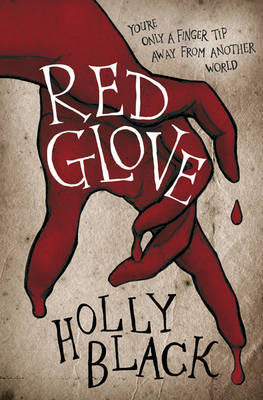 Cassel is a high school senior at a fancy private boarding school in New Jersey. He is also a worker of magic. In a world where all workers are criminalised and feared, he has recently discovered that he has one of the rarest and most prized brands of magic. (That was the spoiler, by the way.) As he starts his senior year, his life takes some interesting turns, precipitated but not telegraphed by events in the first book.
Cassel is a high school senior at a fancy private boarding school in New Jersey. He is also a worker of magic. In a world where all workers are criminalised and feared, he has recently discovered that he has one of the rarest and most prized brands of magic. (That was the spoiler, by the way.) As he starts his senior year, his life takes some interesting turns, precipitated but not telegraphed by events in the first book.
His mother is out of gaol and back to causing mischief, Feds are breathing down his neck and he has confusing relationships with just about everyone in his life. At the start of the novel, he has very little idea what he’s going to do with his life.
I don’t want to simplify it by calling Red Glove a coming-of-age story because I suspect that’s what the overall arc of the trilogy will be. However, it is about Cassel choosing what sort of person he will be. In White Cat he learnt about what sort of person he could be, but now he’s in a position to choose for himself. I have to admit, I wasn’t entirely sure what he’d choose until he did.
Like White Cat, there’s also an element of mystery in the background that Cassel has to solve. It’s not a mystery novel by a long shot, but I like the extra layer. Cassel has to actually work to find out what’s going on (and fix it), which is better than the truth falling into his lap and him just reacting. This element is a strength of this series.
I enjoyed Red Glove about as much as White Cat (but it gets an extra half-star for ephemeral reasons which may ultimately relate to it not being consumed in audiobook form). Cassel is still a sneaky con artist but a lot more things went wrong in his cons and in his life than in the first book. It was entertaining watching him talk his way out of tricky situations. He did spend a lot of the book suffering existential angst to various degrees, which I thought Holly Black handled well. Too often is existential angst done tediously.
If you’ve read and enjoyed White Cat, I definitely recommend reading Red Glove. It’s basically more of the same. If you haven’t read White Cat, then start there. It’s not quite as necessary as with some series, but skipping the first book would definitely diminish the experience.
4.5 / 5 stars
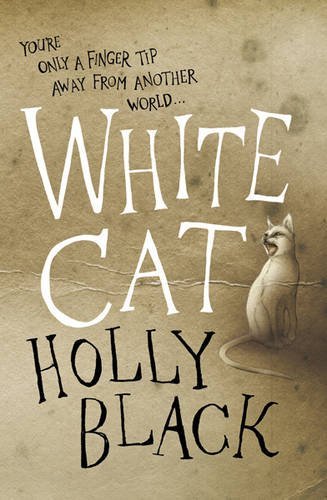 A while ago, Holly Black had some sort of promotion which involved giving away the audiobook of White Cat. That was the edition I consumed.
A while ago, Holly Black had some sort of promotion which involved giving away the audiobook of White Cat. That was the edition I consumed.
What Cat is a quirky YA fantasy book set in more or less the modern world, but with a class of magic workers (also referred to as curse workers or just workers) who everyone is a little scared of and whose practice of magic is generally outlawed (unless they work for the government).
Cassel comes from a worker family in which he is the only one without any abilities. This causes some tension between him and other members of his family, particularly his older brothers. Really, his brotherly relations aren’t terribly good for other reasons and his family has many issues. For example, his grandfather is a deathworker with death-blackened finger stumps and his mother is in gaol for getting caught conning a rich guy with her emotion magic.
Bereft of magic, Cassel is at a good boarding school, happily conning rich fellow students out of their pocket money. One night, he sleep walks onto the dorm roof for no reason anyone can easily explain. Things go downhill from there.
The story is a journey of discovery for Cassel, learning about how he fits into his family, about his past and about friendship. Of course, it’s book one in a trilogy, so not quite everything is explored as fully as I expect it will be by the end. There aren’t any loose ends, however, and no cliffhanger, which is always nice. There’s enough fodder for the next book but it’s not entirely obvious to me which direction it will go in. I do plan to pick up the second book as soon as possible (which is after I finish one more book because of my book buying restrictions).
My favourite aspect was the lying and conning of Cassel. Even though he wasn’t as good at is as he thought, I appreciated the clever plans and webs of lies. I hope that aspect doesn’t change too much in the later books.
Overall an interesting and enjoyable read/listen. I would recommend it to anyone who likes fantasy or who likes their YA a little bit different. (At least, I don’t think I’ve read anything similar recently.) And for the record, the narrator for the audiobook wasn’t annoying, which is always a bonus.
4 / 5 stars.
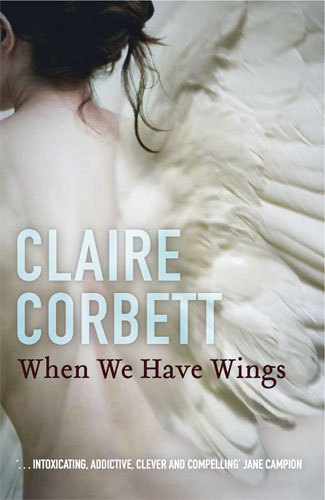 When We Have Wings by Claire Corbett is set in a vaguely near future Sydney where the rich can fly thanks to having wings implanted on their backs.
When We Have Wings by Claire Corbett is set in a vaguely near future Sydney where the rich can fly thanks to having wings implanted on their backs.
Before I get into talking about the story, I want to point out that, from a physics point of view, Corbett has described a very plausible situation. The wings people get are quite large (the impression I got was comparable to the height of the person) and they also get treatments to change the physiology to make their bones lighter (carbon fibre was involved) and their muscles stronger. And, of course, to grow the new muscles needed to control their wings. (For the record, the fictional wings were larger and more interestingly-coloured than on the cover, although it’s a nice cover despite that.)
I have little idea of how plausible the biology was, but assuming those biological modifications were possible, the physics seemed to check out (y’know, without actually writing out equations or anything). The descriptions of flight and weather patterns were also quite rigorous and I commend Corbett on her dedicated research. Those details made the book all the more realistic and helped with the suspension of disbelief so we could focus on the social issues surrounding flight.
The story follows two characters: Zeke, a PI investigating a nanny kidnapping the child of a flyer couple, and Peri, the nanny on the run. The mystery of why and where the nanny took the baby is not the real mystery, however — especially since about half the story is told from her point of view. The real mysteries become apparent when Zeke digs a little deeper and when events get away from everyone.
The setting isn’t a dystopia. Similar to what I said about Spare Parts, just because there is a widening gap between haves and have nots, doesn’t make it a dystopia. Especially when, other than the size of the gap, there aren’t many social or political differences to our world. It’s a commentary on where our world could go, given enough scientific progress. And it doesn’t make the assumption that the medical developments are inherently a bad thing, either. Partly, this is explored through Zeke having to make a choice as to whether to give his toddler son wings from an early age (it’s easier when they’re children) or whether to deprive him of flight and bar entrance into the elite flyer society.
In many ways, flight is a metaphor in When We Have Wings. However, it’s not just a metaphor, as evidenced by the rigorous world building and the real exploration of social issues surrounding flight. What makes us human? How much of a disadvantage is not being able to afford wings? Is being an ordinary human (in their world), without modification, edging towards being a disability since they can’t fly? There was a lot of background political discussion about equality and quotas (of non-modified humans) and equal access. In a world where everyone is expected to choose the most favourable characteristics for their unborn children and concerns like baldness are trivial to “fix” where do you draw the line? If you want an unadulterated genome, where does that leave you (other than as a member of the conservative anti-modification cult)?
Progress marches on.
When We Have Wings was an excellent read. I highly recommend it to fans of science fiction, fantasy and anything in between. I suspect it’s being at least partially marketed as main stream, so hey, all readers of fiction, go out and buy it!
4.5 / 5 stars
So while the attendees are still out partying, I thought I’d post the winners as gleaned from Twitter. The shortlist is here.
To see what people were tweeting throughout the night, Sean has put together a nifty storify page with pictures and tweets and excitement and a sense of being there! Thanks, Sean.
Now, without further ado, the winners, going off the Aurealis twitter feed (mostly to filter out the congratulations and scrolling the hashtag would entail) are…
…
FANTASY NOVEL
Ember and Ash by Pamela Freeman (Hachette)
FANTASY SHORT STORY
“Fruit of the Pipal Tree” by Thoraiya Dyer (After the Rain, FableCroft Publishing)
SCIENCE FICTION NOVEL
The Courier’s New Bicycle by Kim Westwood (HarperVoyager)
SCIENCE FICTION SHORT STORY
“Rains of la Strange” by Robert N Stephenson (Anywhere but Earth, Couer de Lion)
HORROR NOVEL
NO SHORTLIST OR WINNING NOVEL – TWO HONORABLE MENTIONS AWARDED TO:
The Broken Ones by Stephen M. Irwin (Hachette)
The Business of Death by Trent Jamieson (Hachette)
HORROR SHORT STORY (draw)
“The Past is a Bridge Best Left Burnt” by Paul Haines (The Last Days of Kali Yuga, Brimstone Press)
“The Short Go: a Future in Eight Seconds” by Lisa L. Hannett (Bluegrass Symphony, Ticonderoga Publications)
YOUNG ADULT NOVEL
Only Ever Always by Penni Russon (Allen & Unwin)
YOUNG ADULT SHORT STORY
“Nation of the Night” by Sue Isle (Nightsiders, Twelfth Planet Press)
CHILDREN’S FICTION (told primarily through words)
City of Lies by Lian Tanner (Allen & Unwin)
CHILDREN’S FICTION (told primarily through pictures)
Sounds Spooky by Christopher Cheng (author) and Sarah Davis (illustrator) (Random House Australia)
ILLUSTRATED BOOK / GRAPHIC NOVEL (draw)
Hidden by Mirranda Burton (author and illustrator ) (Black Pepper)
The Deep: Here be Dragons by Tom Taylor (author) and James Brouwer (illustrator) (Gestault Publishing)
ANTHOLOGY
Ghosts by Gaslight edited by Jack Dann and Nick Gevers (HarperVoyager)
COLLECTION
Bluegrass Symphony by Lisa Hannett (Ticonderoga Publications)
2011 Peter McNamara Convenors’ Award
Galactic Suburbia podcast – Alisa Krasnostein, Alex Pierce, Tansy Rayner Roberts, Andrew Finch (producer)
2011 Kris Hembury Encouragement Award
Emily Craven of Adelaide
~
Yay and congratulations to all the winners. I hope that in my sleep-deprived state (been observing all week) I didn’t make any mistakes or miss any awards.
Even though I haven’t read it yet (still on my TBR), I think Courier’s New Bicycle by Kim Westwood (for SF novel) is the least surprising award, given all the great things people have been saying about it.
What are your thoughts and/or reactions?
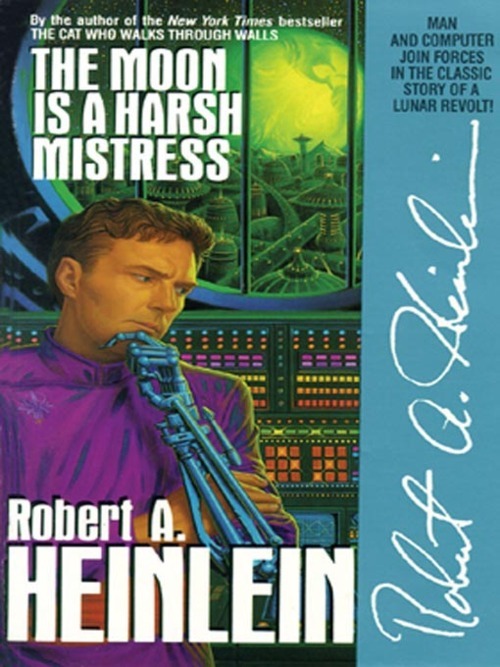 I listened to the audiobook (from Audible) version The Moon is a Harsh Mistress by Robert A Heinlein. It wasn’t an especially pleasant experience and not just because it was so drawn out now that my commutes are only 25 minutes long.
I listened to the audiobook (from Audible) version The Moon is a Harsh Mistress by Robert A Heinlein. It wasn’t an especially pleasant experience and not just because it was so drawn out now that my commutes are only 25 minutes long.
The narrator had a really terrible accent for the main character (the book is in first person). At first I thought the character was supposed to be Italian, but that didn’t make sense in context and in the end I decided he was probably supposed to be Russian. I was able to tune out the confusing accent eventually (and he wasn’t too bad at the other voices, particularly the American and British men). ETA: Also, assuming he was supposed to be Russian, the grammatical mistakes were the wrong sort. The common mistake Russians make when speaking English is leaving out articles or the verb to be because these don’t exist in Russian. Manuel, however, was written as making different errors, which was just another grating thing I tuned out eventually.
What I had more difficulty tuning out were the casual (unintended) sexism, the politics and part of the underlying premise.
Let’s start with the premise. The moon is a penal colony; this part I don’t object to. While it would take up a lot of resources to send prisoners there, it’s not terribly different to sending them to Australia. That part’s OK. And once there, of course mining ice (for their own consumption) makes sense. What doesn’t make sense is using the moon to grow crops: mostly, but not exclusively, wheat. It’s a problem addressed in the actual story when they have issues with nutrients etc (although where the soil they’re growing in doesn’t come up, I don’t think). But the question of why start growing crops on the moon for any reason other than self-sufficiency is not addressed. Really, there’s no way it’s cheaper for Earth to do it this way.
The other part of the setup — the lunar penal colony being rule with an iron fist by a dictator-warden — I have no problem with. In those circumstances, a revolution seems inevitable sooner or later (and if they’d waited ‘til later, they would’ve run out of water to grow their crops with, among other possible issues).
As for the sexism I mentioned, it’s mostly nothing special, just a lot of “she was pretty good at [whatever] for/despite being a girl/woman”. Which got old. The societal structure of the penal colony was such that there were about twice as many men as women and this made the men more protective than usual of the women. There was no rape because if a man tried (or succeeded) to rape a woman, the other men would gang up on him, beat him, and throw him out an airlock. In a way, women had more power than real 1960s women but this was due to their scarcity rather than any inherent sense of equality of aptitudes. Unfortunate, since I think Heinlein was trying to progressive with this writing. For example, Manuel, the main character, is part of a line marriage. This is a system where more wives and husbands are added into a large family. I don’t remember exactly how big it was, but there were maybe 10 wives and “co-husbands”. (I like how the husbands had to have the co- prefix. You know, just in case they were accused of homesexuality or something, an orientation which was conspicuously absent.) The wives had more say over accepting new members into the family (they voted and in some families husbands didn’t get a say) but were still expected to do things like cook and all the housework, while the husbands had “manly work”, like farming or mining or whatnot.
The beginning of the story centres about the central control computer which has gained sentience, as Manuel discovers during his tech support duties. There are flaws in how the computer works, from a technical point of view, but given the book was published in 1966, I’m happy to ignore that. (And the fact that the physics is pretty good helps. And although some of the physiological effects of acceleration were a bit iffy, that’s another area which hadn’t been fully explored in 1966.)
After an activist peacefully-complain-about-the-warden meeting is interrupted by the warden’s men trying to kill everyone. Manuel, who was there only because the sentient computer was interested in the goings on (being a curious sentient, also interested in dissecting humour), is caught up in the crossfire and, with Wyoh, an activist from the other lunar city, escapes and goes underground. They make contact with the Professor, one of the only teachers in Luna City, and the three of them, with the computer, Mike, begin to mastermind a revolution. It ends up being managed on the line between terrorist and freedom-fighter, in my opinion. In terms of how it’s written, it’s very cerebral, with a lot of revolutionary theory and logistics thrown around.
Politically, I was a bit confused about what they wanted, other than to overthrow the warden. I mean, there was no question about overthrowing the warden, but what they wanted for a replacement government didn’t become apparent until after the revolution (which happens at roughly the half-way point). Afterwards — minor spoilers ahead, but really, not important ones — it transpired that the professor, one of the masterminds, was vehemently opposed to taxation which… yeah. I mean, sure, he was a “rational anarchist” but the whole thing, post-revolution, (not just the tax aspect) was a bit too anti-establishment for my taste. And they were a bit too blasé about bombing the Earth which didn’t seem to me to be the best way to gain recognition as a sovereign nation, but maybe that’s just my modern sensibilities talking.
The ending was kind of poignant, I’ll give it that.
Overall I wouldn’t recommend The Moon is a Harsh Mistress. I found it of interest only as a historic text and it has made me hesitant to read more Heinlein in the future. Perhaps I’ll have more luck with my next foray into new (to me) classic SF than I did with this one.
2 / 5 stars
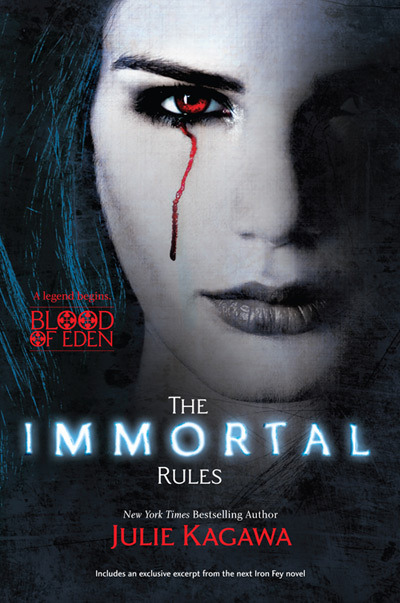 The Immortal Rules by Julie Kagawa grew on me as I read. It started well, but I couldn’t help but feel knowing the premise, as described in the blurb, detracted from the surprise of events near the start. However, this feeling quickly passed and by the time I finished, my overwhelming reaction was AWESOME.
The Immortal Rules by Julie Kagawa grew on me as I read. It started well, but I couldn’t help but feel knowing the premise, as described in the blurb, detracted from the surprise of events near the start. However, this feeling quickly passed and by the time I finished, my overwhelming reaction was AWESOME.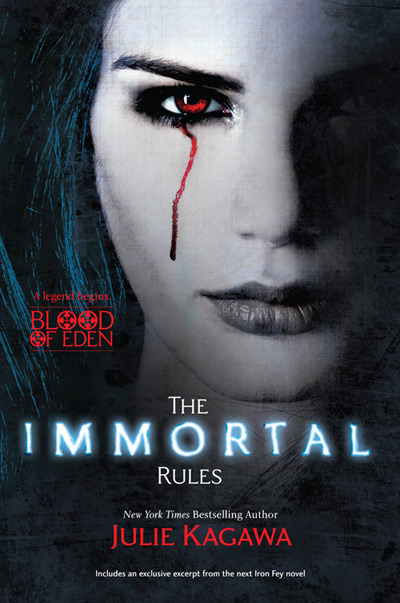
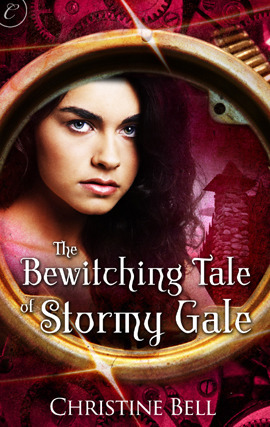
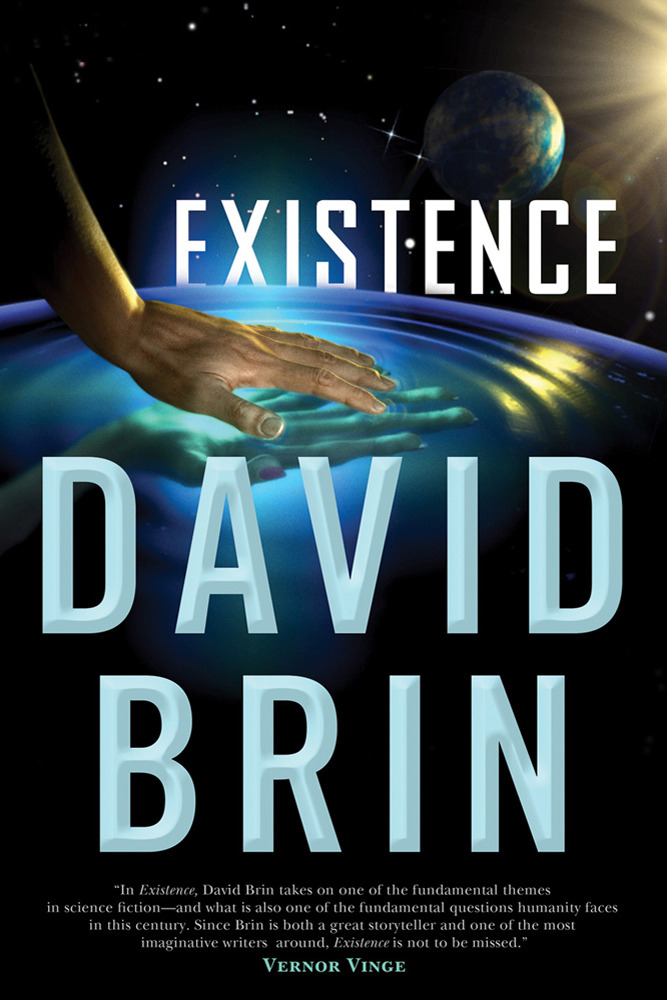
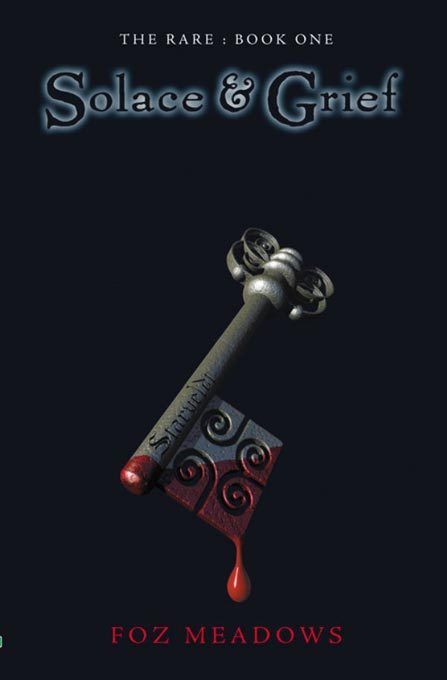
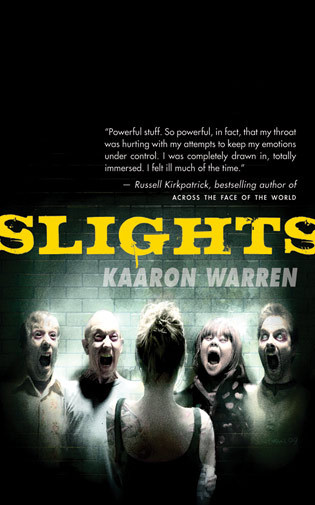 Slights by Kaaron Warren is a disturbing book. This should not come as a surprise to people familiar with the author’s other work (or anyone who read the quote from Russell Kirkpatrick on the cover).
Slights by Kaaron Warren is a disturbing book. This should not come as a surprise to people familiar with the author’s other work (or anyone who read the quote from Russell Kirkpatrick on the cover).
Stevie (short for Stephanie because her parents were expecting a boy) is a psychopath in the literal sense of the word: she lacks empathy, consideration, is obsessive and fairly self-centred. She is not a sympathetic character, but she is fascinating.
After a car accident which kills her mother and puts her in hospital, she has a near-death experience. Instead of seeing a white light or a tunnel or something like that, she finds herself in a room filled with all the people who she’s slighted at some point in the past. Hence the title and hence the cover. (Speaking of the cover, how creepy do the rightmost dude’s eyes look?) And her slighted people do unpleasant things do her.
Beyond that, it’s a difficult book to explain. It doesn’t exactly have a plot, it’s more an examination of Steve’s life, told in first person, including her learning new things about her past as she gets older. Her life isn’t particularly pleasant. I found the first third or so of the book quite confronting and it squicked me out a bit. I had to take breaks from reading it, although that became less necessary as it progressed (or I became desensitised). I wouldn’t suggest this book to anyone with any sort of conventional triggers (particularly sexual ones). Fair warning.
As the book progressed, I felt it became less about horrible things happening to people (sometimes Steve, sometimes others around her) and more about the things happening in Steve’s head. And towards the very end, aspects of her family history that she wasn’t necessarily aware of when they were happening in her youth.
I knew why the people were in the room and who they were; each and every one had been slighted by me, and each slight, by me or anybody else, snapped up a bit of their soul and sent it to the dark room of some unknowing person. Or to my dark room.
The progression of her understanding of the room she goes to when she has near-death experiences (yes, they’re plural, the story would have much less impact if they weren’t) is interesting. I felt it was the kind of book that might be studied in a high school English class, if it was a bit more age-appropriate. I certainly found it more meaningful than some of the novels by Tim Winton I was forced to read.
In case you didn’t pick it up, Slights is definitely a horror novel. Don’t read it if you don’t like icky things or being inside the minds of disturbing people. On the other hand, if you like being disturbed and enjoy a dark psychological read, then this is a good book to pick up.
4 / 5 stars
Thumped by Megan McCafferty is the sequel and conclusion to Bumped. To give you an idea of the world, I include an adapted version of my LibraryThing review of Bumped from when I read it last year:
Bumped is set in a near future where a fertility virus means that people become infertile at around the age of 18. To keep the human race from being wiped out, American culture has become obsessed with teenage pregnancy (and trying to get the highest birth rates in the world).
I’ve tagged the book as dystopian YA SF, which it is, but I think it would appeal to non-SF readers too. The SF-y elements are significantly less prominent than, for example in The Hunger Games or Divergent.
Mostly, this is a book about teenagers coping with a strange world in which they are the only ones that can ensure the existence of the next generation. In different ways, the youth are encouraged/brain-washed into reproducing as much as they can, ether by being professional surrogate (or “pro surrogettes”) or by making amateur babies with their boy/girlfriends.
The story follows twin sisters, Melody raised in the mainstream (American) society, and Harmony raised by conservative, Amish-like Christians. Through their two perspectives (alternating first person) we learn about the world bit by bit. I liked the short chapters which kept the story moving rapidly and gave a feeling of simultaneity for the two plot lines. I also thought the language and slang, particularly of the mainstream sister, was spot on and added authenticity to world building.
Overall, I highly recommend it, although some aspects of the sex-culture could irk some readers.
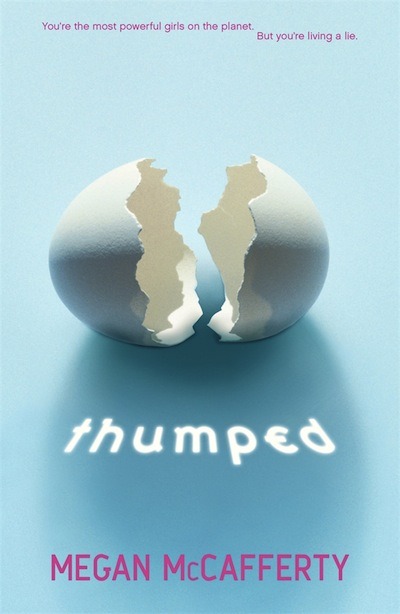 Thumped picked up around eight and a half months after Bumped left off and is a very quick read; I got through it in an evening.
Thumped picked up around eight and a half months after Bumped left off and is a very quick read; I got through it in an evening.
The overtly religious aspects of Harmony got under my skin less in Thumped than in book 1, largely because she spent a lot of this book questioning things. However, I did feel that the book was too short. When I was half or two thirds of the way through, I was wondering how it could possible wrap up all the issues it raised in the pages remaining (in my Random House UK copy, the story ends on page 290). The answer turned out to be: rapidly. It was resolved quickly but I didn’t feel like much was left hanging. I wouldn’t mind seeing a sequel, perhaps with different characters and less fast-paced because I’m curious as to how the world turns out. Unlike more conventional YA dystopias (like The Hunger Games, Divergent, etc) this duology does not follow the formula of
If anything it ends at 1 and merely hints at a non-violent version of 2 to come. Which is a nice change.
Another thing I’d like to mention is that the issues with the world are kind of obvious from the start. It’s even obvious why brainwashing advertising kids into making babies seems like a good idea. But I got sucked into the world enough that, while I agreed with Melody’s reservations, it wasn’t until she articulated the situation at the end that all the ramifications really sunk in.
So Thumped was a nice conclusion to Bumped. I didn’t enjoy it quite as much, but I think that’s mainly because the novelty of the world-concept had worn off. (For the record, I still enjoyed the slang but I felt there was either less of it or I had become immune. Except for “for seriously” because d’uh it should be “for serious”.) On reflection, I think the two books could have been released in one volume (it needn’t even have been a very long volume). Despite the time gap, there were a lot of loose ends in Bumped and they very much feel like one story split into two volumes.
Overall, I would definitely recommend this series to people who like YA, high-concept dystopias, or interesting slang. And if you’ve read and not hated Bumped, you really can’t not read the second half of the story in Thumped.
4 / 5 stars
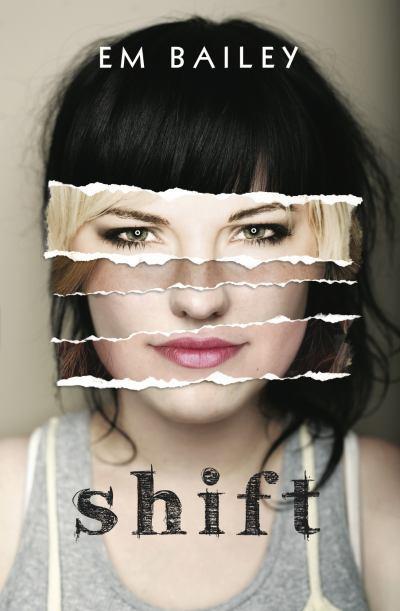 Today, I am excited to present an interview with Em.
Today, I am excited to present an interview with Em.After my earlier post about broad gender distributions in Australian novels last year, Tansy valiantly volunteered to add target age groups and genres to the mighty list of SFFH novels published in 2011. She sent the spreadsheet back to me and I poked Numbers into generating statistics and made some pie charts. Yay, pie charts!
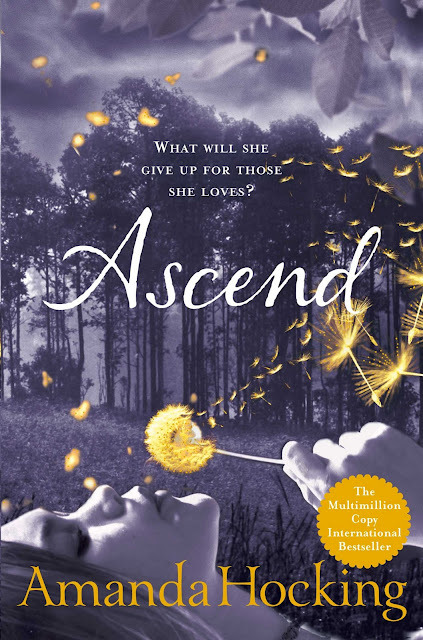
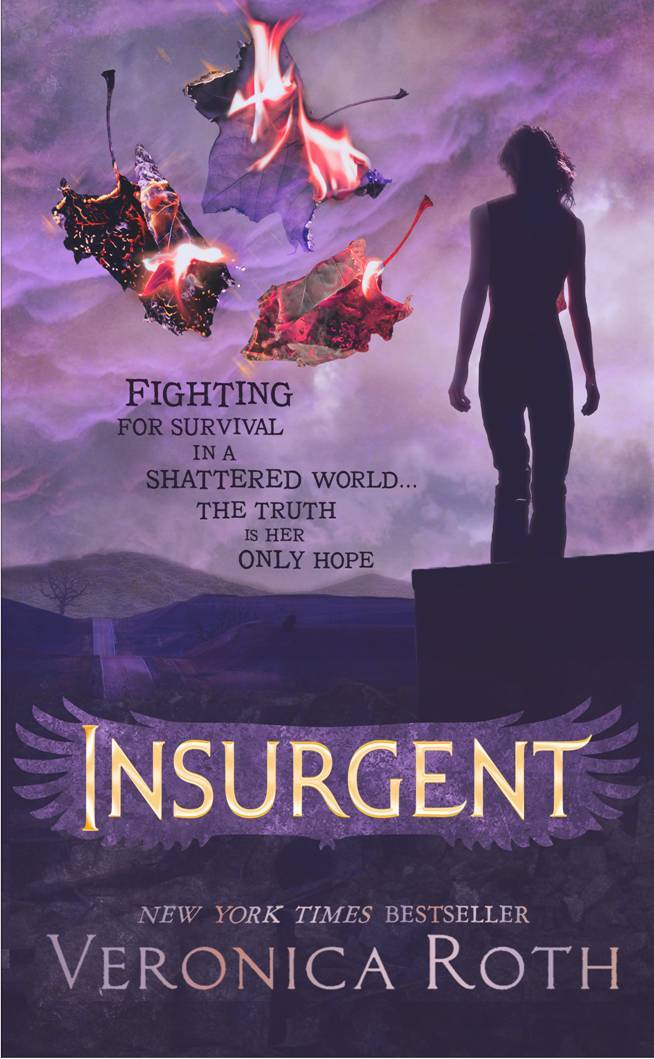
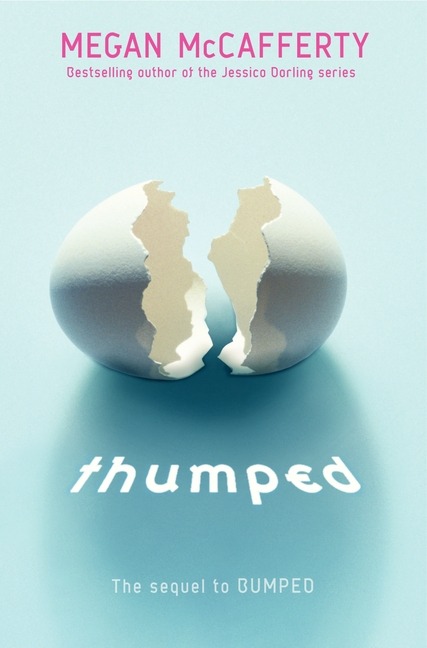
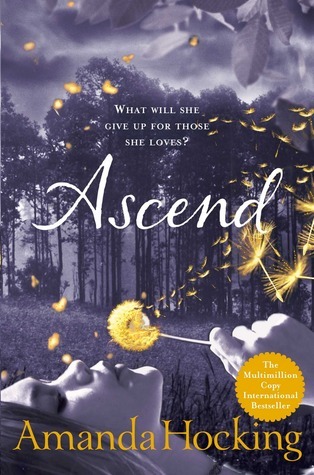 Ascend by Amanda Hocking is the third and final book in the Trylle trilogy. You can read my reviews of the first book, Switched, and the second book, Torn, at their respective links.
Ascend by Amanda Hocking is the third and final book in the Trylle trilogy. You can read my reviews of the first book, Switched, and the second book, Torn, at their respective links.
Ascend picks up the story shortly after Torn left off. As usual, it’s difficult to review a sequel without spoilers, so excuse my vagueness.
Wendy, who only learnt she was a troll Trylle princess in book one, now has to save her kingdom from destruction by the dark and power-hungry king of the Vittra, another race of trolls. The problem, of course, is the Vittra are physically much stronger than the Trylle and the Vittra king is very powerful magically.
As with the previous books, I particularly enjoyed Wendy’s attitudes towards the various love-interesty boys in her life:
The lack of a conventional love triangle is also a big point in this series’ favour. At the end of book two, I was a bit confused as to how the boy she does end up with was a serious contender, but having read Ascend it does work.
I enjoyed this series very much. It’s one of the less conventional YA fantasies I’ve read lately, particularly thanks to the lack of love triangle. And the troll part was novel too, I suppose. I recommend it to anyone who likes YA fantasy/paranormal.
4 / 5 stars